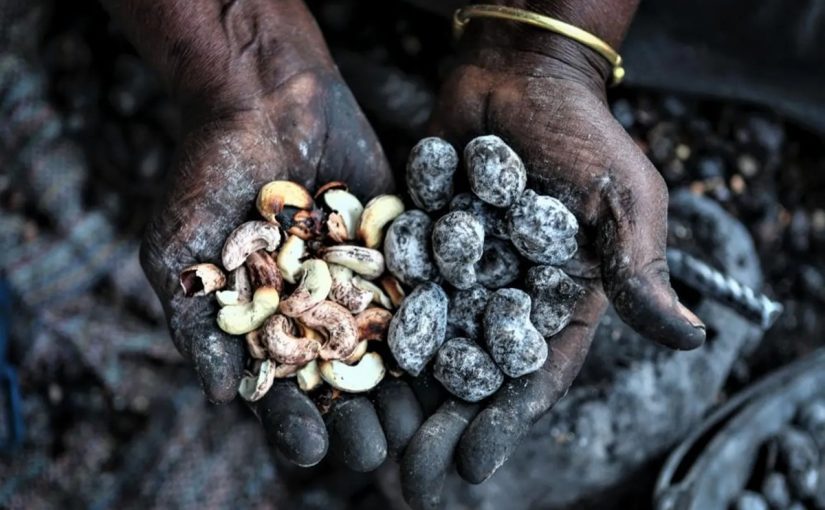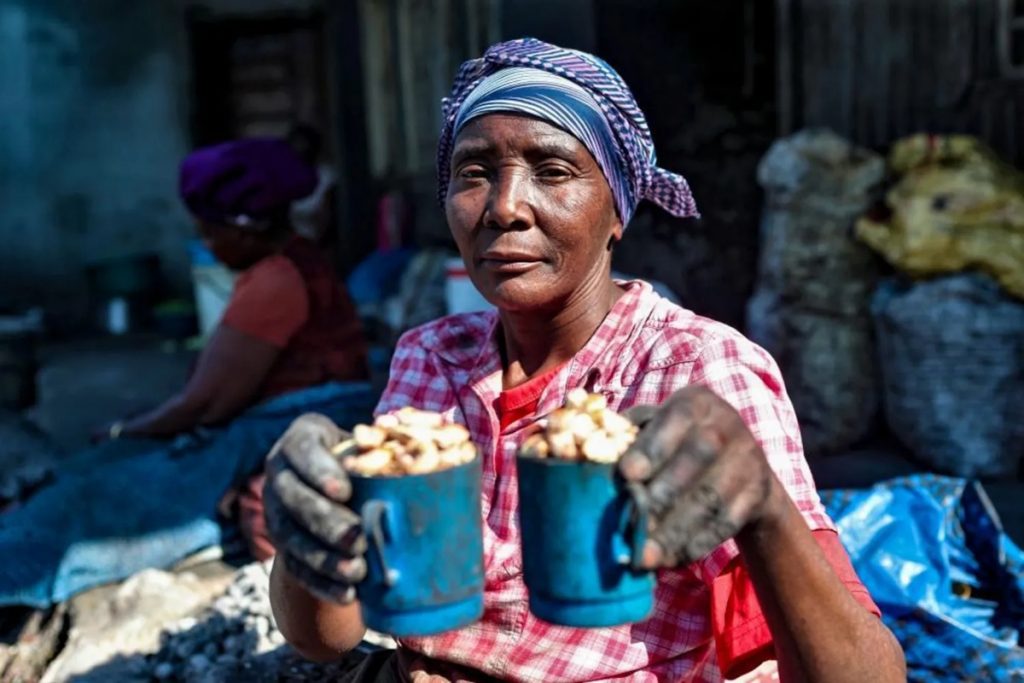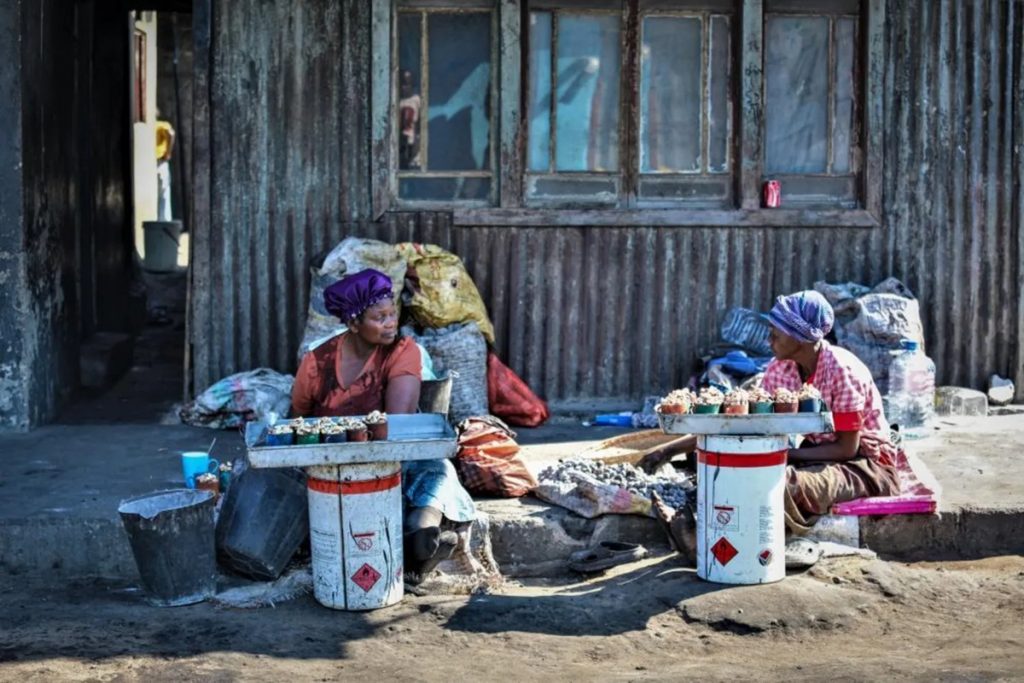India buys 18% of Mozambique exports in 2024 - followed by China, South Africa and Singapore
Wreathed in smoke, women roast cashew nuts in Maputo to support their families

Photo: Lusa
Sitting at the door of a house in Maputo, wreathed in the smoke of cashew nuts roasting, two women, both named Rosalina, support their families with a business that has spanned generations and is once again gaining traction in Mozambique: cashews.
“I wake up at three in the morning to start cracking nuts, at that very time, not long ago,” Rosalina tells Lusa, sitting at the door of her home made of zinc sheet metal and already darkened by the constant soot.
A cashew nut seller, she spends almost all day sitting there, carrying out an artisanal process that involves roasting the nuts and cracking the kernels, one at a time, to fill the glasses displayed in front of her for customers.
Rosalina Justino complains about the price of cashews, fatigue, and stomach pains due to the daily smoke, a 30-year routine that pays the household bills and the education of her children, some of whom are already at university.
She recalls a time when she could buy a cup of cashews at the market for 50 meticais (€0.67) and now it costs three times as much, cutting into her income.
“The profit is small, there’s not much profit because the cashews are expensive,” she laments, holding a bucket of ready-to-eat cashews, which she sells for 120 meticais (€1.60) a cup, while complaining about the lack of customers in the local market.

The Ministry of Agriculture announced on June 27 that cashew nut sales in Mozambique reached 195,400 tons in the last marketing year, approaching the record set in the 1970s, when the country was one of the world’s largest producers.
This production reached over 200,000 tons annually 50 years ago, still during the colonial period, with current sales approaching that historic high in the most recent marketing year, 2024/2025.
Besides their trade and routine, the two women also share a name, differing in age and how long they’ve been selling cashews.
Beside Rosalina Justino is Rosalina Bule, aged 55 and 22 years in the business, who joins the chorus of shared stories between batches, both sharing the common need to support their families.
“I went to Fajardo to buy cashews to roast and sell to feed my children,” says the woman, wiping the sweat from her face with her charcoal-blackened hands. “I might not be able to build a house here, but it’s okay for me, because I can eat, and my children go to school,” she admits.
On school days, the children help out and take the cashews to sell in downtown Maputo, while their mother makes charcoal and cakes to earn a little extra.
“Sometimes I sell charcoal over there and that broom over there, something else, cake, but this is my main job,” she explains.
Both ‘Rosalinas’ place the cashew nuts on a stone and use a piece of iron to break the shell to release the kernel, a movement they repeat hundreds of times a day.
“The corner (where they seat and sell them) is right here because it’s home,” agree the two women who, despite the scarcity, still have loyal customers who buy cashews regularly.

Also in Malanga neighbourhood, at the Fajardo market, is Nelson, who has been traveling to Inhambane province in southern Mozambique since 2008, to buy raw cashews to resell.
Like the ‘Rosalinas,’ Nelson also complains about the instability of the business and low profits, with prices rising in Inhambane and his customers complaining in Maputo.
“We’re always fighting with customers because not everyone accepts [the price]. But it has nothing to do with it, because the prices there [in Inhambane] are unforgiving,” says Nelson.
“Others are complaining [that] the cashews are ours, they’re from Mozambique,” and therefore, the price charged is unjustified, adds the trader, noting that, despite the complaints, the cashews don’t stay on the stall for long.
“I can get them today and they’re gone tomorrow (…). There are people who challenge us too, who do this cashew business and come buy, and we stay two days, three at the most with the cashews,” said Nelson, for whom this business is also the basis of their livelihood.
Until the mid-1970s, Mozambique was the world’s second-largest cashew producer (210,000 tons processed in 1973), behind only India, which purchased a large portion of that production at the time, and still does today.
After Mozambique’s independence on June 25, 1975, production fell to around 15,000 to 20,000 tons per year, but has been growing annually, according to official data.
According to the Ministry of Agriculture, the cashew nut value chain “involves around 1,047,000 families, 69 companies and 7,287 workers across the country” and in Maputo province alone this activity involves 32,168 families, making it “the main centre for nut consumption, generating countless business opportunities”.
The Mozambican government estimates that cashew production, one of the country’s main cash crops, will increase 23% this year, to 218,900 tons, with the area under cultivation also increasing.
In the thick smoke rising from the embers, in the charred bark crackling in the fire, on the unnamed corner, the ‘Rosalinas’ endure the years of toil to support their families.
“I’m tired, my stomach hurts from this fire too, it’s not easy. But what can I do? The children want to eat too; they have to go to school,” Rosalina Justino concludes.













Leave a Reply
Be the First to Comment!
You must be logged in to post a comment.
You must be logged in to post a comment.